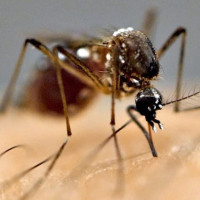- Tuesday, 9 September 2025
Rong Rural Municipality to begin titepati cultivation
By Prem Adhikari,Pashupatinagar, Apr. 4: Rong Rural Municipality in Ilam is set to expand titepati, also called bitter leaf (Indian wormwood), farming to commercialise the agricultural sector. While wild animals such as monkeys and boars are causing distress to farmers, the rural municipality aims to cultivate titepati as a commercial alternative.
Scientifically known as Artemisia vulgaris, titepati is a medicinal plant used to treat various ailments such as abdominal pain, dyspepsia, diarrhoea, and dysentery. It is also consumed as a stomachic and anthelmintic.
The rural municipality has announced plans to commence titepati cultivation under the Prosperity Programme through Forest initiative. When Rural Municipality Chairman Mani Kumar Syangbo took office, his first decision was to introduce the 'Prosperity Programme through Forest'.
According to this initiative, Syangbo said that farmers in the rural municipality would begin titepati farming to enhance commercialisation.
The rural municipality has prepared to purchase 600,000 titepati plants and distribute them to the farmers within the rural municipality free of cost. Syangbo informed that the municipality would provide the plants to the farmers based on the demand.
Titepati has been utilised as a medicinal remedy for treating numerous diseases within the human body. Nepalese titepati, in particular, is highly valued in Japan. Mogja refers to the pulpy substance derived from refining the pith of titepati leaves.
The mogja extracted from titepati itself is utilised as a medicinal remedy. Among the countries producing titepati globally, China ranks first, followed by Japan in second place, Korea in third, and Nepal in fourth. Syangbo said that Nepal boasts the highest quality mogja found worldwide.
He remarked, “The country's trade deficit can be reduced by promoting this farming and exporting it in large quantities.
Its farming would create employment opportunities in rural areas and help to establish a sustainable rural economy.” According to the rural municipality, many farmers will benefit because the titepati cultivation is not eaten by animals such as goats, boars, and monkeys.
Titepati cultivation has been done by TI Angdambe of Panchthar Nawamidanda.
The rural municipality has said that it will coordinate with different companies to sell titepati, which is being sold at Rs. 100 rupees per kilogram.
The rural municipality has already been branding Gundruk (pickled leafy vegetable) and Sisno (nettle). The rural municipality has also been promoting turmeric cultivation.

















